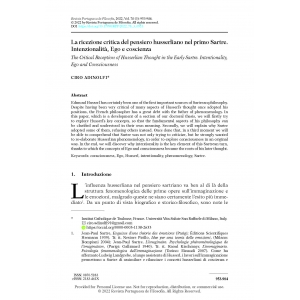Adinolfi, Ciro. “Tra il possibile e l’impossibile. L’etica sartriana negli scritti del ’64 – ’65.” Studi Sartriani 15, (2021): 163-188.
Barbaras, Renaud. Le désir et la distance. Introduction à une phénoménologie de la perception. Parigi: Vrin, 1999.
Barbaras, Renaud. “Désir et manque dans L’Être et le Néant: le désir manqué.” In, Sartre. Désir et liberté, coordonné par Renaud Barbaras, 113-140. Parigi: Puf, 2005.
Barbaras, Renaud. “La phénoménologie comme dynamique de la manifestation.” Les Études philosophiques 98, 3 (2011): 331-349, https://doi.org/10.3917/leph.113.0331.
Barbaras, Renaud. “Sauver d’une réification de la conscience. La tâche de la phénoménologie.” Les Études philosophiques 100, 1 (2012): 49-63, https://doi.org/10.3917/leph.121.0049.
Barbaras, Renaud. Dynamique de la manifestation. Parigi: Vrin, 2013.
Bellantone, Andrea. La métaphysique possible. Philosophies de l’esprit et modernité. Parigi: Hermann, 2012.
Bernet Rudolf, con Kern, Iso e, Marbach, Eduard. Edmund Husserl. Darstellung seines Denkens. Hamburg: Felix Meiner Verlag GmbH, 1989. Tr. it. Claudio La Rocca, Edmund Husserl. Bologna: Il Mulino, 1992.
Bernet, Rudolf. La vie du sujet. Recherches sur l’interprétation de Husserl dans la phénoménologie. Parigi: Puf, 1994, https://doi.org/10.3917/puf.berne.1994.01
Bernet, Rudolf. Conscience et existence. Perspectives phénoménologiques. Parigi: Puf, 2004, https://doi.org/10.3917/puf.berne.2004.01.
Cabestan, Philippe. L’Être et la conscience. Recherches sur la psychologie et l’ontophénoménologie sartriennes. Bruxelles: Ousia, 2004.
Chancel, Jacques. Radioscopie. Tome III. Parigi: Laffont, 1973.
Clayton, Cam. “The Psychical Analogon in Sartre’s Theory of the Imagination.” Sartre Studies International 17, 2 (2011): 16-27, https://doi.org/10.3167/ssi.2011.170202.
Cohen-Solal, Annie. Sartre. 1905-1980. Parigi: Gallimard 2019.
Comolli, Fabrizio. “Le strutture trascendentali della coscienza nel primo Sartre: ipotesi di lettura.” Rivista di filosofia neo-scolastica 81, 1 (1989): 107-137.
Contat, Michel e Rybalka, Michel. Les écrits de Sartre. Chronologie, bibliographie commentée. Parigi: Gallimard, 1970.
Cormann, Grégory. “Passion et liberté. Le programme phénoménologique de Sartre.” In Lectures de Sartre, sous la direction de Philippe Cabestan et Jean-Pierre Zarader, 93-115. Parigi: Ellipses, 2011.
Costa, Vincenzo, con Franzini, Elio e Spinicci, Paolo. La fenomenologia. Torino: Einaudi, 2002.
Costa, Vincenzo. Husserl. Roma: Carocci Editore, 2009.
Crowell, Steven. “Sartre’s existentialism and the nature of consciousness.” In The Cambridge Companion to Existentialism, edited by Steven Crowell, 199-226. Cambridge University Press, 2012, https://doi.org/10.1017/ccol9780521513340.011.
De Beauvoir, Simone. La force de l’âge, 2 T. Parigi: Gallimard, 1960.
De Coorebyter, Vincent. Sartre face à la phénoménologie. Autour de L’intentionnalité” et de “La transcendance de l’Ego”. Bruxelles: Ousia, 2000.
De Coorebyter, Vincent. Sartre. La transcendance de l’Ego et autres textes phénoménologiques. Parigi: Vrin, 2003.
De Coorebyter, Vincent. “L’Image entre le corps et l’esprit. Le Mémoire de fin d’études de Sartre.” Sartre Studies International 25, 1 (2019): 1-21, https://doi.org/10.3167/ssi.2019.250102.
Depraz, Natalie. Transcendance et incarnation. Le statut de l’intersubjectivité comme alterité à soi chez Husserl, préf. de Rudolf Bernet. Parigi: Vrin, 1995.
Di Martino, Carmine, Esperienza e intenzionalità. Tre saggi sulla fenomenologia di Husserl. Milano: Guerini e Associati, 2013.
Farina, Gabriella. “Quelques réflexions sur l’“Esquisse d’une théorie des émotions” à propos de l’affectivité de la pensée.” Études sartriennes 17/18, (2014): 7-19.
Flajoliet, Alain. La première philosophie de Sartre. Parigi: Honoré Champion Éditeur, 2008.
Gerassi, John. Talking with Sartre. Yale University, 2009. Tr. it. Raoul Kirchmayr, Parlando con Sartre. Conversazioni al caffè. Milano: Il Saggiatore, 2011.
Giovannangeli, Daniel. “Cogito et transcendance de l’ego.” Études sartriennes 7, (1998): 7-16.
Guenancia, Pierre. La voie de la conscience. Husserl, Sartre, Merleau-Ponty, Ricœur. Parigi: Puf, 2018, https://doi.org/10.3917/puf.guena.2018.01.
Henry, Michel. Phénoménologie matérielle. Parigi: Puf, 1990. Tr. it. Pietro D’Oriano, Fenomenologia materiale. Milano: Guerini e Associati, 2001.
Hintikka, Jaakko. “The phenomenological dimension.” In The Cambridge Companion to Husserl, edited by Barry Smith and David Woodruff Smith, 78-105. Cambridge University Press, 1995, https://doi.org/10.1017/CCOL0521430232.003.
Hopkins, Robert. “Imagination and affective response.” In Reading Sartre. On phenomenology and existentialism, edited by Jonathan Webber, 100-117. New York: Routledge, 2011, https://doi.org/10.4324/9780203844144.
Husserl, Edmund. Logische Untersuchungen. Halle: Niemeyer, 1922. A cura di Giovanni Piana, 2 voll., Ricerche logiche. Milano: Il Saggiatore, 1968.
Husserl, Edmund. Ideen zu einer reinen Phänomenologie und phänomenologischen Philosophie. Kluwer Academic Publishers B.V., 1952. Tr. it Enrico Filippini, rev. Vincenzo Costa, Idee per una fenomenologia pura e per una filosofia fenomenologica. Milano: Mondadori, 2008.
Husserl, Edmund. Die Krisis der europäischen Wissenschaften und die transzendentale Phänomenologie. L’Aja: Martinus Nijhoff’s Boekhandel en Uitgeversmaatschappij, 1959. Tr. it. Enrico Filippini, pref. Enzo Paci, La crisi delle scienze europee e la fenomenologia trascendentale. Milano: Il Saggiatore, 2015.
Husserl, Edmund. Cartesianische Meditationen un Pariser Vorträge. Kluwer Academic Publishers B.V. 19632. Tr. it. Filippo Costa, Meditazioni cartesiane. Con l’aggiunta dei Discorsi parigini. Milano: Bompiani, 2009.
Husserl, Edmund. Zur Phänomenologie des Inneren Zeit-Bewusstseins (1893-1917), Husserliana X. Den Haag, 1966. Tr. it. Alfredo Marini, Per la fenomenologia della coscienza interna del tempo (1893-1917). Milano: Franco Angeli, 1998.
Jeanson, Francis. Le problème moral et la pensée de Sartre. Parigi: Éditions du Seuil, 1965.
Landgrebe, Ludwig. “Husserl, Heidegger, Sartre. Trois aspects de la Phénoménologie.” Revue de Métaphysique et de Morale 69, 4 (1964): 365-380.
Marion, Jean-Luc. Réduction et donation. Études sur Husserl, Heidegger et la phénoménologie. Parigi: Puf, 20042, https://doi.org/10.3917/puf.mario.2010.01.
Marion, Jean-Luc. Étant donné. Essai d’une phénoménologie de la donation. Parigi: Puf, 20052, https://doi.org/10.3917/puf.mario.2013.02.
Marion, Jean-Luc. “Remarques sur l’origine philosophique de la donation.” Les Études philosophiques 100, 1 (2012): 101-116, https://doi.org/10.3917/leph.121.0101.
Morris, Phyllis Sutton. “Sartre on the Transcendence of the Ego.” Philosophy and Phenomenological Research 46, 2 (1985): 179-198, https://doi.org/10.2307/2107352.
Pommier, Eric. “La différence phénoménologique entre Barbaras et Marion (projet, méthode et ligne de tension).” Trans/Form/Ação 43, 3 (2020): 111-136, https://doi.org/10.1590/0101-3173.2020.v43n3.08.p111.
Priest, Stephen. The Subject in Question. Sartre’s critique of Husserl in The Transcendence of the Ego. Londra/New York: Routledge, 2000, https://doi.org/10.4324/9780203461433.
Ronchi, Rocco. “Introduzione. Oltre la fenomenologia. La questione della coscienza assoluta nella Transcendance de l’Ego.” In La trascendenza dell’Ego. Milano: Christian Marinotti Edizioni, 2011.
Sartre, Jean-Paul. “La transcendance de l’Ego. Esquisse d’une description phénoménologique.” Recherches philosophiques 6, (1936): 85-124. Poi Parigi: Vrin, 1966. Tr. it. Nestore Pirillo, a cura di Rocco Ronchi, La trascendenza dell’Ego. Milano: Christian Marinotti Edizioni, 2011.
Sartre, Jean-Paul. “Une idée fondamentale de la phénoménologie de Husserl: l’intentionnalité.” Nouvelle Revue Française 304, (1939). Poi in Situations I. Parigi: Gallimard, 1947.
Sartre, Jean-Paul. Esquisse d’une théorie des émotions. Parigi: Éditions Scientifiques Hermann, 1939. Tr. it. Nestore Pirillo, Idee per una teoria delle emozioni. Milano: Bompiani, 2004.
Sartre, Jean-Paul. L’imaginaire. Psychologie phénoménologique de l’imagination. Parigi: Gallimard, 1940. Tr. it. Raoul Kirchmayr, L’immaginario. Psicologia fenomenologica dell’immaginazione. Torino: Einaudi, 2007.
Sartre, Jean-Paul. Saint Genet. Comédien et martyr. Parigi: Gallimard, 1952. Tr. it. Corrado Pavolini, Santo Genet. Commediante e martire. Milano: Il Saggiatore, 2017.
Sartre, Jean-Paul. Intervista concessa a Michel Contat e Michel Rybalka, “Sur « L’Idiot de la famille ».” In Le Monde 14 maggio 1971. Ora in Situations, X. Politique et autobiographie. Parigi: Gallimard, 1976: 91-115. Tr. it. AA.VV., “Su L’idiota della famiglia.” In L’universale singolare. Saggi filosofici e politici 1965-1973, a cura di Raoul Kirchmayr. Milano: Mimesis, 2009: 121-137.
Sartre, Jean-Paul. Carnets de la drôle de guerre. Parigi: Gallimard, 20153. Tr. it. Paul-André Claudel, Taccuini della strana guerra. Bari: Acquaviva, 2002.
Sartre, Jean-Paul. “Les racines de l’éthique. Conférence à l’Institut Gramsci, mai 1964.” Études Sartriennes 19, (2015): 11-118.
Scanzio, Fabrizio. Sartre et la morale. La réflexion sartrienne sur la morale de 1939 à 1952. Napoli: Vivarium, 2000.
Sherman, David. “Sartre and his German Influences.” In Mattew C. Eshleman C. and Constance L. Mui L. (edited by), The Sartrean Mind, 52-64. Londra: Routledge, 2020, https://doi.org/10.4324/9781315100500-3.
Sommerlatte, Curtis. “Your Past Comes Back to Haunt You. Sartre on Pure Reflection in Response to Husserl & Levinas.” Sartre Studies International 26, 2 (2020): 63-89, https://doi.org/10.3167/ssi.2020.260206.
Stawarska, Beata. “Memory and Subjectivity: Sartre in Dialogue with Husserl.” Sartre Studies International 8, 2 (2002): 94-111, https://doi.org/10.3167/135715502781825064.
Trincia, Francesco Saverio. “Intenzionalità, coscienza, io. Il primo Sartre e Husserl.” Bollettino Studi Sartriani 2, (2006): 153-188.
Zahavi, Dan. “From no ego to pure ego to personal ego.” In Hanne Jacobs (edited by), The Husserlian Mind, 269-279. Londra: Routledge 2021, https://doi.org/10.4324/9780429243790-26.









